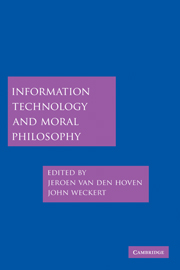Book contents
- Frontmatter
- Contents
- List of Contributors
- Introduction
- 1 Norbert Wiener and the Rise of Information Ethics
- 2 Why We Need Better Ethics for Emerging Technologies
- 3 Information Ethics: Its Nature and Scope
- 4 The Transformation of the Public Sphere: Political Authority, Communicative Freedom, and Internet Publics
- 5 Democracy and the Internet
- 6 The Social Epistemology of Blogging
- 7 Plural Selves and Relational Identity: Intimacy and Privacy Online
- 8 Identity and Information Technology
- 9 Trust, Reliance, and the Internet
- 10 Esteem, Identifiability, and the Internet
- 11 Culture and Global Networks: Hope for a Global Ethics?
- 12 Collective Responsibility and Information and Communication Technology
- 13 Computers as Surrogate Agents
- 14 Moral Philosophy, Information Technology, and Copyright: The Grokster Case
- 15 Information Technology, Privacy, and the Protection of Personal Data
- 16 Embodying Values in Technology: Theory and Practice
- 17 Information Technology Research Ethics
- 18 Distributive Justice and the Value of Information: A (Broadly) Rawlsian Approach
- Select Bibliography
- Index
- References
12 - Collective Responsibility and Information and Communication Technology
Published online by Cambridge University Press: 21 July 2009
- Frontmatter
- Contents
- List of Contributors
- Introduction
- 1 Norbert Wiener and the Rise of Information Ethics
- 2 Why We Need Better Ethics for Emerging Technologies
- 3 Information Ethics: Its Nature and Scope
- 4 The Transformation of the Public Sphere: Political Authority, Communicative Freedom, and Internet Publics
- 5 Democracy and the Internet
- 6 The Social Epistemology of Blogging
- 7 Plural Selves and Relational Identity: Intimacy and Privacy Online
- 8 Identity and Information Technology
- 9 Trust, Reliance, and the Internet
- 10 Esteem, Identifiability, and the Internet
- 11 Culture and Global Networks: Hope for a Global Ethics?
- 12 Collective Responsibility and Information and Communication Technology
- 13 Computers as Surrogate Agents
- 14 Moral Philosophy, Information Technology, and Copyright: The Grokster Case
- 15 Information Technology, Privacy, and the Protection of Personal Data
- 16 Embodying Values in Technology: Theory and Practice
- 17 Information Technology Research Ethics
- 18 Distributive Justice and the Value of Information: A (Broadly) Rawlsian Approach
- Select Bibliography
- Index
- References
Summary
Recently, the importance of the notion of collective moral responsibility has begun to be realised in relation to, for example, environmental degradation and global poverty. Evidently, we are collectively morally responsible for causing environmental damage of various kinds and degrees; and, arguably, we have a collective responsibility to assist those living in extreme poverty. However, thus far, the focus in theoretical and applied ethics has been on collective responsibility for actions and omissions, that is, for outward behaviour. There has been scant attention paid to collective responsibility for knowledge acquisition and dissemination, that is, for inner epistemic states. Further, although the notion of individual responsibility in relation to computer technology has been the subject of a certain amount of philosophical work, this is not so for collective responsibility. In this chapter, I seek to redress these imbalances somewhat by examining the notion of collective responsibility in so far as it pertains to the communication and retrieval of knowledge by means of information and communication technology.
The chapter is in two main parts. In Part A, I apply my collective end theory (Miller 2001, chapters 2 and 5) of joint action, and its associated technical notions of joint procedures, joint mechanisms, and collective ends, to the process of the acquisition of certain forms of social knowledge. The focus here is on analysing the communication, storage, and retrieval of knowledge by means of information and communications technology (ICT) in terms of the collective end theory.
- Type
- Chapter
- Information
- Information Technology and Moral Philosophy , pp. 226 - 250Publisher: Cambridge University PressPrint publication year: 2008
References
- 7
- Cited by



